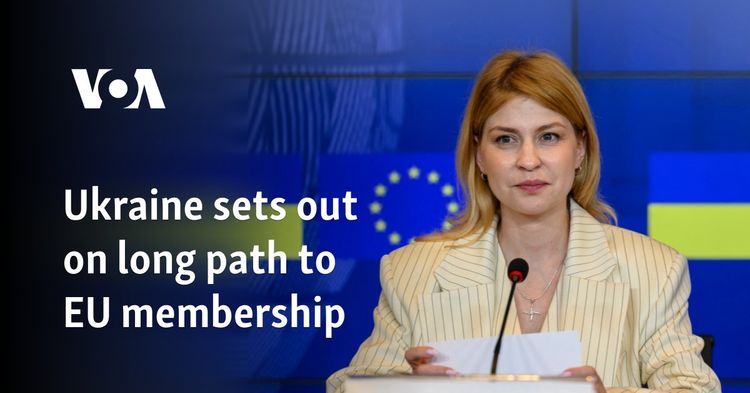Ukraine sets out on long path to EU membership

Authorities in Ukraine are fully committed to engaging in the complex and challenging negotiations that come with the start of discussions for EU membership. They believe that they have achieved significant progress towards meeting the requirements for becoming a member, which would solidify their position in Western Europe.
The Kyiv government has stated that they are dedicated to meeting the strict standards set by the bloc in various areas such as agricultural policy and human rights, despite knowing that the process may take many years or even decades. This commitment was made clear during a ministerial-level meeting in Luxembourg that started on Tuesday.
According to Ivanna Klympush-Tsintsadze, a Ukrainian lawmaker who previously served as the vice-prime minister for European and Euro-Atlantic integration, Ukraine has been preparing for this process and is not caught off guard. She shared this during an interview with VOA.
She mentioned that the country has gone through big changes since signing an agreement with the EU in 2017, especially when it comes to getting rid of visa requirements.
Ukraine was officially accepted as a candidate to join the EU in June 2022, shortly after Russia started a large-scale attack on the country. Moldova, which was also accepted as an EU candidate around the same time as Ukraine, started negotiations to join the EU on Tuesday.
The President of the European Commission, Ursula von der Leyen, commended Ukraine for its progress during a speech to the Ukrainian parliament in November 2023. She mentioned that the country has exceeded expectations and made significant advancements, especially considering the challenges of being in a state of conflict.
Klympush-Tsintsadze stressed that it is important for everyone in society and political groups to work together if Ukraine wants to keep moving forward toward joining the EU.
She mentioned that making significant improvements in the civil service and public administration of Ukraine will be challenging. To achieve this, it is crucial to involve all aspects of civil society, various political parties, and stakeholders. Additionally, having transparent discussions with the public about the necessary but challenging actions is essential.
These tasks involve Ukraine, just like any country applying for membership, to align its laws and standards with those of the EU in 35 different areas, called chapters. These areas cover a wide range of topics, such as the free movement of goods, fisheries, taxation, energy, environment, judicial rights, and security.
Every part of the negotiation must be approved by all 27 EU countries, which makes the process long and complicated.
The Ukrainian Deputy Minister of Economy, Tatiana Berezhna, expressed similar thoughts to her coworker about Ukraine's preparedness for the challenges ahead. During a chat with VOA, she pointed out that Ukraine has successfully reviewed the adoption of European laws.
Berezhna, in charge of discussing the sections on employment, social matters, and the movement of workers, proclaimed that Ukraine has completed its preparation since the application and is now prepared to start negotiations.
So far this year, Ukrainian government officials have attended multiple information sessions with members of the European Commission.
"Once the talks have begun, we will be having a number of meetings covering all the different areas of legislation," Berezhna explained. "We know that this will take a while, but we are excited to come together with our European counterparts again."
Wojciech Przybylski, who leads a team that predicts policies at the think tank Visegrad Insight in Warsaw, made a comparison between the future of Ukraine and Poland. He noted that Poland was able to finish negotiating its membership with the EU in just five years.
He mentioned that talks to allow Ukraine to join the EU began right before Hungary, who does not support Ukraine's entry or any future expansion of the EU, starts leading the EU for the next half year.
"We understand that there may be a temporary decrease or halt in the cycle, but this will be revisited during the Polish EU presidency in January," stated Przybylski, who is of the opinion that the EU needs to expand in order to continue existing and flourishing.
Luckily, at this moment, there is a growing political momentum. We must increase this political backing and broaden the network of those who will endorse expansion politically.
Seeing Ukraine as the epicenter of Europe's largest armed conflict since World War II, Przybylski views expansion as "the key to peace in Europe, with the EU serving as a tool for promoting peace in the region."
He mentioned that Ukraine becoming a part of the EU will be an important factor in that journey.



































































